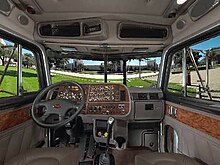Peterbilt 379
This article has multiple issues. Please help improve it or discuss these issues on the talk page. (Learn how and when to remove these messages)
|
| Peterbilt 379 | |
|---|---|
 2003 Peterbilt 379 American Class interior 550 hp CAT C15 18 speed | |
| Overview | |
| Type | Truck |
| Manufacturer | Peterbilt |
| Model years | 1987–2007 |
| Assembly | Denton, Texas |
| Body and chassis | |
| Class | Class 8 truck |
| Body style | 2-door truck 2-door sleepercab truck |
| Related | Peterbilt 377 Kenworth W900 |
| Powertrain | |
| Engine | Diesel (Cummins, Caterpillar, Detroit Diesel, Paccar) |
| Chronology | |
| Predecessor | Peterbilt 359 (1967–1986) |
| Successor | Peterbilt 389 |

The Peterbilt 379 is a model line of Class 8 trucks that was produced by the Peterbilt division of PACCAR from 1987 to 2007. Serving as the successor to the 359, the 379 was a conventional-cab truck configured primarily for highway use, serving as the flagship of the Peterbilt model line. During much of its production, the 379 was popular among owner-operator drivers. In line with the Kenworth W900, the 379 serves as a popular basis for truck customization.
Following its 2007 discontinuation, the 379 was replaced by the Peterbilt 389, distinguished by oval headlamp clusters and a longer hood. To commemorate the end of production, the final 1000 examples of the 379 were designated as Legacy Class 379.[1]
Overview
[edit]The largest highway truck sold by Peterbilt at its launch, the 379 was produced in two configurations, a 119-inch BBC (bumper to back of cab length) and an extended-length hood, for a 127-inch BBC. The 379 is externally distinguished from the 359 from the use of an enlarged windshield (allowing for horizontally-mounted windshield wipers); the 379 also introduced headlamp-mounted turn signals (relocated from the fender), making rectangular headlamps standard.[1]
The cab structure of the 379 is shared with numerous Peterbilt conventional trucks produced since 1986 (with the exception of the 587 and 579); it also shares its doors with the 362 and 372 cabover trucks.[1]
Powertrain
[edit]Throughout its production, the 379 was equipped with the most powerful versions of the engines offered in Class 8 on-highway vehicles. Some of the turbodiesel engines included the Caterpillar 3176, C-11, C-12, C-13, C-15, C-16 and the 3406-(B,C,E,P and EWS), Cummins the Big Cam NTC, N-14, ISM, ISX, ISMe5, ISXe5, Signature 600, and Detroit Diesel 60 series.[1]
See also
[edit]References
[edit]- ^ a b c d "Peterbilt 379 Performance and Capabilities". 17 March 2021.
External links
[edit] Media related to Peterbilt 379 at Wikimedia Commons
Media related to Peterbilt 379 at Wikimedia Commons
